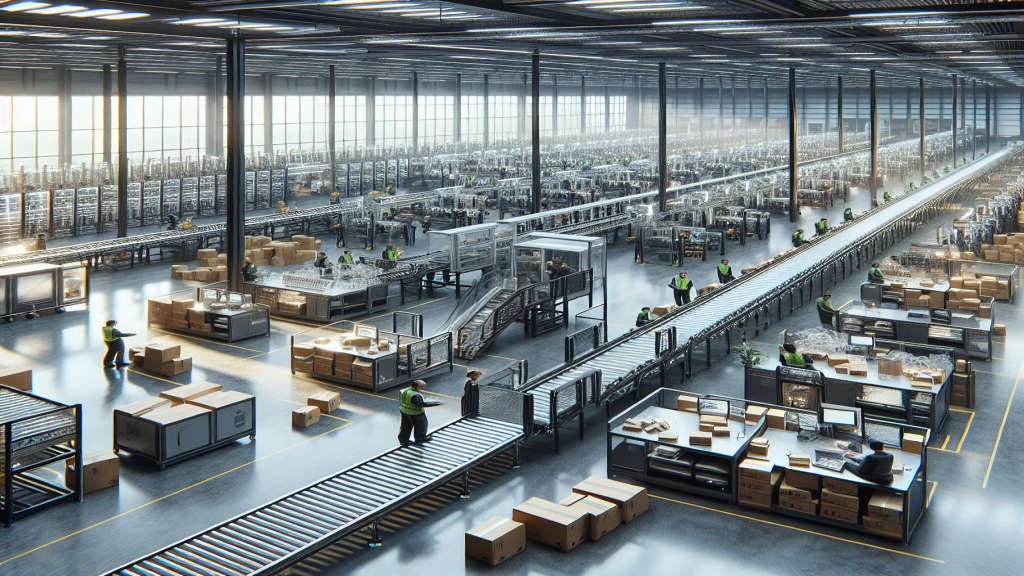In today’s fast-paced digital marketplace, the efficiency of an e-commerce operation can make or break a business. One powerful tool for enhancing this efficiency lies in the adept use of Fulfillment Services. These services revolutionize how businesses manage orders, inventory, and delivery. By outsourcing fulfillment services, online retailers can focus more on innovation and customer experience, rather than logistics. This strategic shift not only reduces overhead costs but also speeds up delivery times, enhancing user satisfaction. The adoption of the best and most affordable fulfillment services offers businesses, especially small ones, a competitive edge in a crowded market. Whether you are searching for fulfillment services near me or looking for tailored fulfillment services solutions, understanding their transformative power is key to unlocking new efficiencies in e-commerce.
Main Points
- Explore how Fulfillment Services for eCommerce enhance operational efficiency.
- Understand the benefits of outsourcing fulfillment services.
- Learn about the importance of choosing the right fulfillment services for small businesses.
- Discover the impact of using the most affordable fulfillment services

Understanding the Role of Fulfillment Services in Modern E-Commerce
Today’s digital marketplace thrives on efficiency, and that’s where Fulfillment Services for eCommerce become indispensable. They keep the wheel of online shopping turning smoothly, yet their intricate networks may seem tangled to the uninitiated. These Best Fulfillment Services ensure that products swiftly journey from warehouses to your doorstep. But how do they balance speed and cost? Interestingly, technologies like AI and automation streamline processes, while eco-conscious strategies subtly shape logistics. It’s bewildering yet critical; knowing what defines an Affordable Fulfillment Service can be elusive. Consider the tapestry of selection and shipping processes intertwined within these services. Perhaps, the real magic rests in algorithms intricately managing omnichannel orders – or does it?
Key Elements to Consider:
- Speed: How quickly can they deliver?
- Cost-Efficiency: Is the service truly affordable without hidden fees?
- Technology: Are they leveraging cutting-edge AI for logistics?
Related content:
Unlocking Success: How a Fulfillment Services Company Can Transform Your Business
Unlocking Success: A Deep Dive into the Best Fulfillment Services for E-commerce Entrepreneurs
Unlocking Growth: How Fulfillment Services for eCommerce Can Transform Your Business
Unlocking Success: How Fulfillment Services Can Transform Your E-Commerce Strategy
How Fulfillment Services Enhance Customer Satisfaction and Loyalty
Imagine running a business without the headache of managing inventory, packaging, and shipping. Fulfillment Services for small businesses make this dream a reality, ensuring that customers receive their orders promptly. A satisfied customer is a loyal customer, right? By outsourcing these tasks, businesses can focus on growth while professionals handle logistics. Yet, isn’t it intriguing how Outsourcing Fulfillment Services can also generate an unexpected sense of loyalty? Understanding this might be a bit puzzling. Proximity also plays a crucial role. When wondering, “Are there Fulfillment Services near me,” consider the impact on delivery times. Faster service usually translates to happier customers. But here’s where it gets a little tricky: speed isn’t everything. Quality packaging and accurate delivery information complete the satisfaction puzzle. So, what’s the takeaway here? Consider all angles before diving into fulfillment. Curious, isn’t it?
The Impact of Automation in Fulfillment on E-Commerce Efficiency
Automation subtly transforms e-commerce operations. It alters not just the visible, but also the back-end magic, enhancing efficiency in ways often unnoticed. When we consider fulfillment services, the role of automation becomes incredibly crucial. Picture this: a vast, bustling warehouse with robots swiftly moving between aisles, picking and packing without a pause. It sounds futuristic, yet it’s today’s reality. But is such technology always a straightforward boon? Machines excel in speed and accuracy, but what about the unforeseen hiccups? Do they possess the flexibility to adapt, or do they falter where human intuition shines? Automation, despite its brilliance, invites new questions. Perhaps, its impact is as multifaceted as it is transformative. While solutions keep emerging to enhance systems, one might wonder — at which point do we trade off control for convenience? As e-commerce marches forward, maintaining equilibrium remains essential. Exploring these dynamics is key to understanding the future of fulfillment and its broader implications.
Cost Reduction Strategies through Efficient Fulfillment Processes
In today’s dynamic market, businesses constantly seek strategies to cut costs without sacrificing quality. One crucial area is the optimization of fulfillment processes. Efficiently streamlining operations can significantly reduce expenses. This isn’t merely about implementing new technologies. It’s about creating a symbiotic relationship between human expertise and advanced tools. Yet, how does one approach it intelligently? There lies the paradox: simplification through complexity. Implementing diverse logistic solutions may initially confuse but soon reveals clarity.
Key Techniques to Consider
- Automation: The real gain is not in replacing humans but in augmenting their capabilities with the help of technology.
- Inventory Management: It’s a dance between having enough and having too much. Finding that sweet spot saves costs.
- Supplier Relationships: Think of it as a team sport. Strong relations create better negotiation power and reduce costs.
- Data Analytics: This involves uncovering hidden patterns that could either bewilder or benefit operations.
Modern businesses must embrace the complexities of fulfillment to unearth true cost reduction potential. Understanding and navigating these nuances will distinguish the leaders from the followers in this ever-evolving landscape.
Leveraging Technology in Fulfillment Services for Competitive Advantage
Embracing technological advancements in fulfillment services has become more of a necessity than a choice, hasn’t it? Businesses striving to gain a competitive advantage often find themselves navigating a labyrinth of options. Yet, how many truly capitalize on technology’s full potential? It isn’t just about deploying the latest software. The key lies in harnessing data analytics, automation, and seamless integration to enhance efficiency. This isn’t merely about keeping up with trends; it’s a means to outsmart and outpace competitors. Nonetheless, understanding which technology to adopt—now, that requires a sharp eye and strategic foresight.
Striking the Balance
Scalability and Flexibility: Meeting E-Commerce Demands with Fulfillment Solutions
In the ever-evolving world of e-commerce, striking a balance between scalability and flexibility remains crucial. Businesses face the challenge of fluctuating demands; one minute you’re sipping coffee, the next you’re drowning in orders. “Flexibility is the key to stability,” as noted by the acclaimed economist John Dewey, yet what does this mean in a digital marketplace?
Companies can deploy innovative fulfillment solutions to adapt. Options like just-in-time logistics and dynamic warehousing offer elasticity but can also perplex. Imagine a fluid inventory system that spontaneously expands, shrinking to meet real-time orders without a hitch. Herein lies the labyrinth – at what cost does this adaptability come? And is it sustainable in the long run?
| Scalability Options | Benefits | Challenges |
|---|---|---|
| Just-in-Time Logistics | Reduces Waste | Inventory Risks |
| Dynamic Warehousing | Space Efficient | Resource Heavy |
To meet e-commerce’s demands, understanding these strategies becomes essential. The paradox? Sometimes, the more you can adjust, the less you’re prepared for the unexpected tide of change. Isn’t that the case with any growing venture, anyway?
Exploring the Environmental Benefits of Optimized Fulfillment Services
In today’s fast-paced world, optimized fulfillment services have become a vital player in environmental sustainability, offering a peculiar balance. Fascinatingly, these innovative solutions reduce the carbon footprint of traditional logistics, yet, how well do we truly understand their impact? Many believe they cut energy consumption significantly, but do we ever ponder how efficiency can sometimes lead to unexpected challenges? Embracing these modern systems, companies can, strangely enough, enhance their operational effectiveness while simultaneously taking significant strides in saving our planet.
Intrigued? Here’s why:
- Reduced Transportation: Streamlined processes minimize the need for unnecessary vehicle trips.
- Energy Efficiency: Advanced technologies often require less energy than traditional methods.
- Waste Minimization: Better inventory management reduces overproduction and waste.
In this whirlwind of technological advancement, one must question: Can these so-called optimized services overthrow traditional methods and bring about real, tangible environmental benefits? As we delve deeper into these peculiarities, it becomes evident that the optimized approach can indeed urge the logistics sector towards a more sustainable and greener future, but only time will tell how effectively.
Conclusion
In conclusion, fulfillment services have become a catalyst for efficiency in the ever-evolving e-commerce landscape. They streamline operations and enable businesses to focus on core competencies like product development and customer engagement. This not only improves customer satisfaction but also enhances brand loyalty. Moreover, fulfillment services offer scalability, allowing businesses to adapt quickly to market demands without compromising service quality. By embracing these solutions, companies can navigate the complexities of online retail with greater ease and agility. As e-commerce continues to grow, leveraging fulfillment services will undoubtedly prove to be a game-changer for businesses aiming to stay competitive and thrive.
Frequently Asked Questions
What are fulfillment services?
Fulfillment services are third-party solutions that handle the storage, packaging, and shipping of products on behalf of businesses. They help streamline the logistics process, allowing businesses to focus on other core activities.
How do fulfillment services work?
Fulfillment services typically work through a series of steps: receiving inventory, storing products, processing orders as they come in, picking and packing the products, and then shipping them to the customer. They often provide order tracking and inventory management as well.
What are the benefits of using fulfillment services?
The benefits include cost savings on shipping, improved efficiency, better scalability, enhanced accuracy in order processing, and the ability to offer faster shipping options to customers. It also allows businesses to save time and focus on marketing and sales.
Who should consider using a fulfillment service?
Businesses that have grown beyond their capacity to handle order logistics on their own, those that wish to provide faster shipping options, and e-commerce companies looking to expand their reach without investing heavily in infrastructure should consider using fulfillment services.
What should I look for in a fulfillment service provider?
Key considerations include the provider’s locations, shipping speed and options, technology integration capabilities, cost structure, scalability, customer service quality, and experience in your industry or product type.

